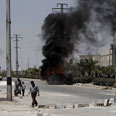
Syria rebels say Assad using 'mass-killing weapons' in Aleppo
Syrian opposition says Damascus forces using thermobaric weapons on civilians in northern Syria; Damascus TV reports forces 'cleansing area of terrorists'
Syrian opposition sources claim that the Assad regime used "mass-killing thermobaric weapons" on civilians in Aleppo, in northern Syria, the UK's Times reported on Friday.
Thermobaric are lethal weapons that explode above a target area with a massive blast and suck air in, leaving a vacuum.
Related stories:
- Assad's termobarics – courtesy of Russia
- Turkey's nightmares coming true in Syria
- Syria: Bomb blast in state TV building in Damascus
Commanders of the Free Syria Army (FSA) said that the heavy shelling over the Aleppo suburb of Salaheddin included the use of such weapons.
"We have staged a tactical withdrawal. The district is completely empty of rebel fighters. Regime forces are now advancing into Salaheddin," Hossam Abu Mohammed was quoted by the newspaper as saying.
Both rebel forces and human rights groups reported that warplanes and tanks had attacked towns north of Aleppo. FAS officials said that Syrian President Bashar Assad's forces were trying to cut the main rebel supply route into the city.
Syrian state television said that the regime forces "cleansed" Salaheddin from terrorists.
Meanwhile, veteran Algerian diplomat Lakhdar Brahimi is expected to be named to replace Kofi Annan as the UN-Arab League joint special envoy for Syria barring a last-minute change, diplomats said on Thursday.
An announcement could come as early as next week but the diplomats, who spoke on condition of anonymity, warned that there are sometimes last-minute changes if a key government has concerns about the appointment or the candidate himself has misgivings.
Also on Friday, the British government said it is offering £5 million ($7.8 million) to Syria's rebel forces to pay for communications equipment and medical supplies.
In an op-ed article for the Times of London published Friday, Foreign Secretary William Hague said the UK would intensify contacts with the political wing of the Free Syrian Army, to "prepare for the inevitable day of (President Bashar) Assad's fall."
Diplomats said Hague would announce the details of the new funding later, but insisted that none of the money would be used for weapons.
"We must build relationships now with those who may govern Syria in the future," Hague said.
Reuters contributed to this report
- Receive Ynetnews updates directly to your desktop










